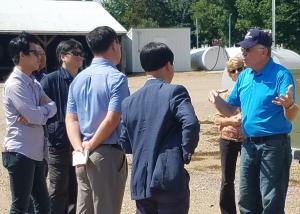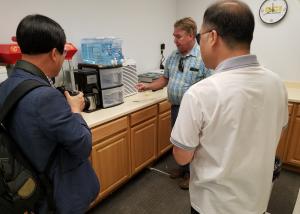Trade teams from South Korea have met face-to-face with U.S. farmers and grain suppliers in eight states in the last three months – all part of work by the U.S. Grains Council (USGC) to secure and expand U.S. exports to the third largest market for U.S. corn and distiller’s dried grains with solubles (DDGS).
The four teams represented the diverse sectors with which the Council works on developing markets in South Korea, including government officials, industrial corn buyers, feed grain importers and bioethanol advisory teams. The breadth and depth of representation on these teams reflect the importance of the South Korean market as well as the dedication by the Council and our member organizations to further developing the long-standing relationship and future growth opportunities with this large market.
“South Korea is a mature market, but one that is still growing significantly,” said Cary Sifferath, USGC senior director of global programs. “Demand for U.S. coarse grains and co-products continue to grow steadily year-after-year.”
South Korea is the third largest importer of U.S. corn and U.S. DDGS thus far in the 2016/2017 marketing year (Sept.-July), the strongest exports for both in the last five marketing years. South Korea has more than doubled purchases of U.S. corn year-over-year with 5.53 million metric tons (218 million bushels) in sales (Sept.-July).
Exports of U.S. DDGS to South Korea are up 30 percent year-over-year to nearly 919,000 tons thus far in 2016/2017 (Sept.-July). Ninety-six percent of feed millers in South Korea now include U.S. DDGS in their rations for the country’s livestock and poultry industries, thanks in part to work started by the Council in 2004 to introduce this feed ingredient. Now the Council is working to increase average inclusion rates by providing additional technical expertise through conferences like one conducted in country in April 2017.
And South Korea has purchased 42 million gallons of U.S. ethanol in 2016/2017 with one month remaining in the marketing year. Current U.S. ethanol exports are for industrial use in South Korea, making wider use in the transport fuel sector another area of potential growth.
South Korean grain buyers, end-users and government officials value the marketing information and discussions on quality that the Council helps to provide and facilitate, primarily through Haksoo Kim, USGC director in Korea. Trade teams, like the four this summer, further support the goals of continuing to secure existing markets and expand exports into new sectors.
“Quality is of particular importance to South Korea,” Sifferath said. “These teams allow our customers to meet face-to-face with U.S. corn producers as well as see how quality is handled from the farm, through the first point of sale, into the export channels and at the export facility.”
In addition to sharing technical information and logistical support, the U.S. – Korea Free Trade Agreement (KORUS) provides duty-free access for U.S. corn, sorghum, DDGS and ethanol exports. The agreement, which went into effect in 2012, also included a 2,500 ton (nearly 115,000 bushels) duty-free quota for U.S. barley, which increases two percent each year while full tariffs are phased out, as well as important provisions offering increasing market access for beef, pork and poultry products.
Across the industrial sectors in South Korea, corn buyers are very conscious of both quality and price, making the duty-free provisions of the U.S.-Korea Free Trade Agreement (KORUS) particularly important to help maintain U.S. exports. The combination of market access, attractive prices and USGC market development work ensure this long-standing and large partnership between the United States and South Korea is here to stay.
Find more on the Council’s work in South Korea here


